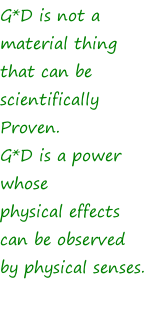




 NEXT
NEXT
 BACK
BACK

Philosophical musings on Quanta & Qualia; Materialism & Spiritualism; Science & Religion; Pragmatism & Idealism, etc.


 Forum
Forum

 Recent Posts
Recent Posts
Post 6. 12/01/2017
Alternative Theory of Reality & Deity
The Case for Deism
Imaginative, but primitive, conceptions of the creative powers of reality have repeatedly inspired the founders of religions to call for worship of an awesome all-knowing all-powerful Creator, who presumably has the power of life & death over his creatures, but is knowable only by imagination. Yet, in the real world, that existential authority seems to be applied somewhat randomly & impartially instead of vengefully or benevolently. So, perhaps the conjectured deity is not motivated by base human emotions, but by more sublime purposes -- say for example, mathematical values. The average man-on-the-street might have difficulty relating to such a cold-blooded intellectual abstraction. But we all can relate to the only part of G*D that we know for sure : the pale blue dot we call home -- sometimes savage, other times maternal. Such oppositions & contradictions in reality may explain why all religions tend to evolve from their founder's simple idealistic philosophical outlines of deity to more fleshed-out temperamental personalities, consorting with a tragicomic panoply of angels, demons, saints, and prophets. Such king-like gods are not presented as cooly rational & perfectly consistent, but as all-too-human in their capricious & unpredictable imperfections.
The key problem with most religions though, is that their various belief systems are narrowly circumscribed by their peculiar god-models. Their incompatible worldviews evoke the parable of the Blind Men examining an Elephant. Which is why the non-dogmatic religious philosophy of Deism could serve as the basis for a truly ecumenical world religion. Unfortunately, the entrenched beliefs of religions with bitterly-contested traditions are held with deeply-rooted emotions, and have repeatedly proven resistant to any new ideas, except those presented with the emotional power and persuasion of the sword. So, we can't reasonably expect broad-minded intellectual & pacifist Deism to take the religious world by storm, any time soon. Instead, the practical and soulful benefits of a BothAnd worldview, as advised by deep thinkers from Socrates to Buddha to Chopra, will have to gradually diffuse into the common mind over several more generations, before bringing an end to the striving between polarized Either/Or zealots. Meanwhile, a minor sect of post-enlightenment sages -- a semi-mystical cult of Nature & Science, if you will -- may have to tend the flame of rational religion in dark niches on the frayed fringes of secular & religious world wars. Hooded robes are optional.
To sum up, I can see why some critical thinkers don't believe in a God who is directly involved in the human affairs of the world. But I can also see why subjective believers feel that an afterlife is a logical necessity, if not a biological certainty, in order to balance the scales of justice for a benevolent but beleaguered deity who couldn't get it done in this life. Perhaps the persistent inequities of natural hierarchies and the resulting unfairness of social systems -- despite the best intentions of all religious programs -- are the key arguments against a human-loving prayer-answering worship-demanding God-in-heaven. Consequently, my proposed alternative deity is neither the all-good God of obsequious flattery, nor the evil incarnate of various Satanic fables; neither the bestower of blessings upon the faithful, nor the author of eternal damnation on those of other faiths. But merely the awesome enigmatic creative force behind all aspects of reality. The hypothetical G*D of the real world is not Good or Evil, but both Good and Evil. Hence, the scale-balancing BothAnd principle of the Enformationism worldview.
End of Post 6


Either/Or :
You’re either with us or against us; either Jew or Gentile; either Christian or Muslim; either Believer or Infidel; either Theist or Atheist.

Quora Qote : Prove God Exists
Christopher Finch, PhD - Theology, Forensic Scientist, Deist
<<When it comes to deists, we do not make exotic claims about God. The only thing that we choose to believe in, is that God exists as the architect behind the universe and natural laws. The universe was set in motion, and that is where our belief stops.
As to why we choose to believe in God, deists use science and personal observations/experiences of the universe around us. We do not make the claim that God absolutely, positively, 100% beyond a doubt, exists. Instead, we state that because of various pieces of evidence that point toward God, we choose to believe in God.
Some of that evidence is the Fine-tuned Universe Theory, the complexity of the DNA language, the astronomical odds of life forming randomly, the Goldilocks zone for habitable planets, the multiple and unique biological markers in each of us, and a cause behind the Big Bang (which science can’t explain).
. . . . .
Evidence of God will be subjective. Each individual has the right to choose whether or not to believe in God. No view should be forced onto another.
God can’t be verified or disproved. Debating Its existence is a futile effort.>>
https://www.quora.com/When-it-comes-to-God-why-is-the-burden-of-proof-on-believers/answer/Christopher-Finch-5?share=aec5398a&srid=umKAX


Note :
Deism won’t save your soul, heal your cancer, or give your non-self release in Nirvana, but in principle it can provide most of the philosophical and inter-personal functions of religion that don’t depend on blind faith.
Deism, in my view, is not a specific set of beliefs, but merely an attitude toward religious questions that is both sympathetic and skeptical. It is aware that strong beliefs tend to be based on skimpy evidence. Yet it accepts that human nature requires an internally consistent worldview. So it simply looks for the best compromise between emotional faith and rational facts.






 NEXT
NEXT
 BACK
BACK




 Recent Posts
Recent Posts





